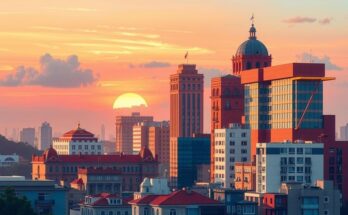The Afrobarometer Round 10 survey reveals critical insights into Liberia’s socio-economic landscape, indicating a divide among citizens on national direction and economic conditions. Notable concerns include governance engagement, foreign influence, women’s rights, and migration intentions. The survey highlights the need for robust policies to address these issues and enhance democratic governance in Liberia.
In Monrovia, a pivotal conference organized by the Center for Democratic Governance was held on March 13, 2025, at the Corina Hotel to discuss vital issues affecting Liberia, based on the Afrobarometer Round 10 survey findings. The survey explored Liberians’ perspectives on key topics, including climate change, economic conditions, migration, and international relations, reflecting their views on the future.
Mr. Elkanah Y. Taylor, the Program Coordinator at the Center, presented the survey’s methodology and findings, showcasing the divided opinions among citizens about Liberia’s direction. Half of the respondents (50%) believe the country is on the right track, while an equal number disagree. Economic perspectives were also split: 48% rated the situation poorly, while 45% viewed it favorably. Personal living conditions displayed similar ambivalence, with 46% dissatisfied and an equal share content. However, optimism prevailed regarding economic improvement, as 61% anticipated positive changes in the next year, reflected by a rise in government performance ratings.
The survey revealed a strong consensus against authoritarian governance, with a large majority favoring democratic values. Key findings included that 79% perceive local government councilors as disengaged, and 88% feel similarly about members of parliament. Alarmingly, 66% believe that officials committing crimes seldom face repercussions, and 58% are concerned about political interference in the judicial system’s fairness.
Regarding foreign influence, the survey highlighted that 68% of respondents view China as a significant player in Liberia’s economy. Conversely, 86% hold a favorable opinion of American influence, with 79% and 58% viewing China’s and India’s impacts positively, respectively. Only 39% extend similar sentiments towards Russia. Furthermore, over three-quarters acknowledge the favorable contributions of ECOWAS and the AU in Liberia, emphasizing a need for neutrality amidst the ongoing Russia-Ukraine conflict.
The survey also examined awareness of climate change, with 68% of participants confirming their understanding of the issue, and 71% believe climate change negatively affects living conditions in Liberia. A spectacular 82% asserted that the government and affluent nations must act decisively against climate change. Support for government-led initiatives, such as investments in renewable energy, was robust, with 81% advocating for such measures.
In terms of women’s rights, the survey indicated that 78% of Liberians believe women should have autonomy over marriage and childbearing. Additionally, 77% support educational opportunities for pregnant girls, and 61% consider abortion justified under specific circumstances, such as health risks to the mother or pregnancies resulting from rape.
Migration issues were prominent, with 77% of respondents considering leaving Liberia, particularly among educated and employed individuals. Economic prospects were the primary driver for this sentiment, with North America being the preferred destination for 52% contemplating emigration.
Overall, the survey results underscore the complexities of Liberia’s socio-economic landscape, highlighting an urgent need for responsive policies to address economic, social, and environmental challenges while promoting inclusivity and democratic governance.
The Afrobarometer Round 10 survey offers essential insights into the socio-economic dynamics of Liberia. A sharp divide exists regarding perceptions of the nation’s trajectory, with significant concerns about governance, economic conditions, and social issues. The widespread belief in the importance of democracy and action on climate change reflects citizens’ aspirations for a better future. Urgent policy responses are essential to tackle these challenges and foster a more inclusive society.
Original Source: frontpageafricaonline.com




